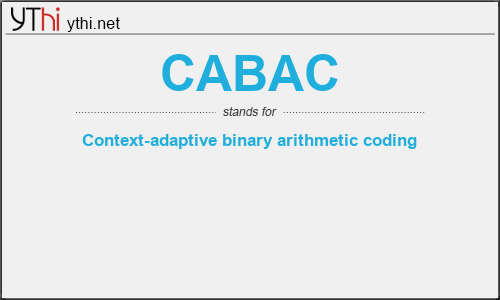What does CABAC mean? What is the full form of CABAC?
The full form of CABAC is Context-adaptive binary arithmetic coding
Context-adaptive binary arithmetic coding (CABAC) is a form of entropy encoding used in the H.264/MPEG-4 AVC and High Efficiency Video Coding (HEVC) standards. It is a lossless compression technique, although the video coding standards in which it is used are typically for lossy compression applications. CABAC is notable for providing much better compression than most other entropy encoding algorithms used in video encoding, and it is one of the key elements that provides the H.264/AVC encoding scheme with better compression capability than its predecessors.
In H.264/MPEG-4 AVC, CABAC is only supported in the Main and higher profiles (but not the extended profile) of the standard, as it requires a larger amount of processing to decode than the simpler scheme known as context-adaptive variable-length coding (CAVLC) that is used in the standard’s Baseline profile. CABAC is also difficult to parallelize and vectorize, so other forms of parallelism (such as spatial region parallelism) may be coupled with its use. In HEVC, CABAC is used in all profiles of the standard.
Lossless video coding improves the coding efficiency of the standard H.264/AVC. In this work, we adjusted the standard H.264/AVC to make it conservative. We removed the quantification process of the standard H.264/AVC coding chain because this block is the first responsible for the degradation of the reconstructed video. In the framework of the lossless compression, we compared two entropy codings: CABAC (context-based adaptive binary arithmetic coding) and CAVLC (context-based adaptive variable length coding). The simulation results showed that CABAC reduces the total bit of the coded sequence, but increased the execution time compared to CAVLC. Thanks to the lossless video coding, the gain performance reached from 15 to 19 %.
see also What does CAVLC mean? What is the full form of CAVLC?
see also What does H264 mean? What is the full form of H264?
CABAC
means
Context-adaptive binary arithmetic coding![]()
Translate Context-adaptive binary arithmetic coding to other language.


Leave a Reply
You must be logged in to post a comment.